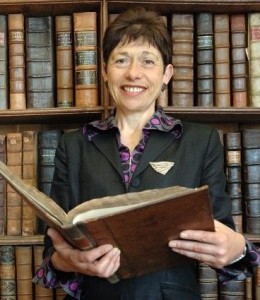On Wednesday 4th March 2015 CISoR members, members of the Centre for the History of the Sciences, plus guests, were treated to a public lecture by Dr Patricia Fara of the University of Cambridge. Entitled “Fighting For The Vote: Science And Suffrage In World War One”, the talk began with an undeniable truism from Hertha Ayrton (1854-1923) “I do not agree with sex being brought into science at all.
The idea of “woman and science” is completely irrelevant. Either a woman is a good scientist, or she is not.” Fara went on to explore the notion that “The war revolutionised the industrial position of women. It found them serfs, and left them free” Millicent Fawcett (1919). She based her talk around 5 major themes:
- Marching for Science
- Working for war
- Insiders and outsiders
- Action overseas
- Post-war realities
Luminaries such as Charles Darwin and HG Wells were “found out” expressing views that, while no doubt “of their time” would find no place in an enlightened society (“The chief distinction in the intellectual powers of the two sexes…is shown by man’s attaining to a higher eminence in whatever he takes up, than can woman – whether requiring deep thought, reason, or imagination, or merely the use of the senses or the hands” (Darwin); “The contemporary woman of fashion…is an unwholesome stimulant…she achieves by artifice a sexual selection profounder than that of any other vertebrated animal. She outshines the peacock’s excess…”(Wells)). Moreover Patricia introduced us to the character of “The Antysuffrgyst or Prejudicion” a comical animal with a very small brain capacity and imperfect sight. The talk chronicled the contribution that women made to the advancement of science (in transport, engineering and medical supplies) during WW1. For instance the minister of munitions (1916) stated that “our armies have been saved and victory assured by the women in the munition factories.” Nonetheless issues of unequal pay and women being shut out of male dominated scientific societies still predominated. For instance Hertha Ayrton was not awarded a degree from Cambridge and was rejected for Fellowship of the Royal Society. The Universities however were, thankfully, praised for their role (‘perhaps the only sphere in which at that time young men and women worked freely together – the laboratories of a modern university” – Helen Gwynne-Vaughan, the Head of the Department of Botany, Birkbeck College from 1909). Patricia ended by making the point that, despite these monumental strides, when the men returned after the war, most things returned to how they had once been. Cicely Hamilton was quoted as saying ‘the battle we had thought won is going badly against us – we are retreating where once we advanced; in the eyes of certain modern statesmen women are not personalities – they are reproductive faculty personified. Which means that they are back at secondary existence, counting only as “normal” as wives and mothers of sons.” It was a slightly melancholy end to what was a highly enjoyable presentation that was well received by staff, students and guests from a myriad of academic disciplines.
